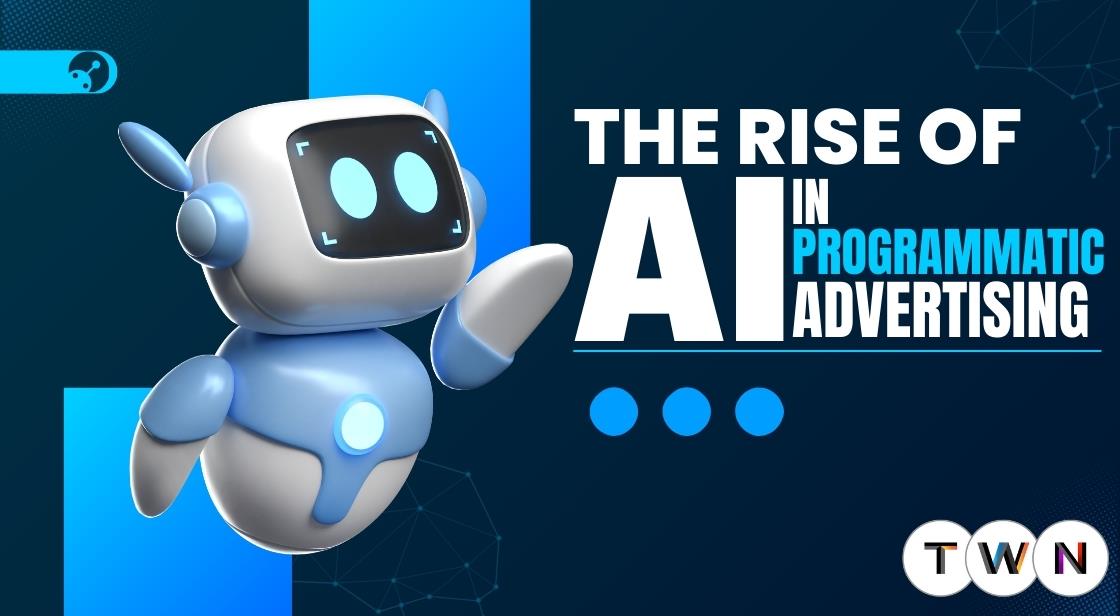The Rise of AI in Programmatic Advertising

Blog Post
Artificial Intelligence (AI) is reshaping the landscape of digital advertising, and programmatic advertising is no exception. Once seen as a futuristic concept, AI has quickly become an integral component of today’s advertising strategies.
Its transformative capabilities, including enhanced targeting accuracy, cost efficiency, dynamic creative optimization, and predictive analytics, are revolutionizing the way ads are bought, sold, and displayed.
As AI continues to advance, it is crucial to understand its current role in programmatic advertising. Is it merely a transient trend, or has it established itself as an indispensable technology?
This blog delves into AI’s significant impact on programmatic advertising, exploring how it enhances targeting precision, streamlines processes, and drives better outcomes.
We'll also address concerns about job displacement, emphasize the necessity of AI adoption, and discuss the imperative for businesses to stay ahead of AI’s evolving capabilities.
In a market where staying competitive is more challenging than ever, AI is no longer a concept for the future—it is the present reality.
AI’s Role in Programmatic Advertising: Temporary Trend or Permanent Shift?
Artificial intelligence is transforming the landscape of digital advertising, including programmatic advertising. Most marketers are either already utilizing AI-driven tools in their programmatic strategies or are planning to do so soon, with only 5% having no such intentions.
AI's capabilities—such as advanced personalization, optimized bidding, and predictive analytics—are set to play a crucial role in the cookieless future, making it a game-changer in the industry. As the programmatic sector continues to evolve with emerging trends, the question remains: is AI merely a passing trend, or is it an essential technology?
What is Programmatic Advertising?
Programmatic advertising is the automated buying and selling of digital ad inventory. It's a process that uses software and algorithms to purchase ad space across various digital platforms, such as websites, apps, and social media, in real-time.
How Does Programmatic Advertising Work?
-
Advertisers define their target audience: Advertisers specify the type of audience they want to reach based on demographics, interests, and behaviors.
-
Real-time bidding (RTB): Advertisers bid on ad inventory in real-time auctions. The highest bidder wins the ad placement.
-
Ad delivery: The winning ad is instantly displayed to the target audience.
Key Benefits of Programmatic Advertising
-
Efficiency: Automates the ad buying process, saving time and resources.
-
Precision: Allows for highly targeted ad delivery based on audience data.
-
Real-time optimization: Enables adjustments to campaigns based on performance metrics.
-
Increased reach: Access to a vast inventory of ad spaces across various platforms.
-
Measurable results: Provides detailed performance data to evaluate campaign effectiveness.
Common Types of Programmatic Advertising
-
Real-time bidding (RTB): Advertisers bid on ad inventory in real-time auctions.
-
Private marketplaces (PMPs): Advertisers buy ad inventory from a select group of publishers.
-
Programmatic guaranteed (PG): Advertisers purchase ad inventory upfront at a fixed price.
In essence, programmatic advertising is a data-driven approach that helps advertisers reach the right audience with the right message at the right time, optimizing ad spend and maximizing ROI.
The Role Of AI In Programmatic Advertising
Programmatic advertising has revolutionized the way ads are bought and sold by automating these processes. While programmatic advertising itself is quite advanced, the integration of artificial intelligence (AI) has taken it to a new level. AI enhances programmatic advertising by improving targeting accuracy, streamlining tasks, and increasing overall efficiency. Here’s a closer look at how AI benefits and transforms programmatic advertising.
Enhanced Targeting Accuracy
One of the significant advantages of AI in programmatic advertising is its ability to enhance targeting precision. AI analyzes vast amounts of user behavior data more effectively than traditional methods. By examining patterns and preferences, AI helps advertisers reach their potential customers with greater accuracy. This improved targeting increases the return on investment (ROI) for ads, as the ads are shown to users who are more likely to engage with them.
Cost Efficiency
AI contributes to cost efficiency in programmatic advertising by reducing wasted impressions. By analyzing data in real-time, AI ensures that ad budgets are allocated more effectively. This means that advertisers spend less on impressions that are unlikely to convert and more on reaching their target audience, optimizing their ad spend and improving overall campaign performance.
Dynamic Creative Optimization
Dynamic creative optimization is another area where AI makes a significant impact. AI enables the personalization of ads by adjusting creative elements in real-time based on user data. This means that marketers can deliver highly relevant ads to the right users at the right time. The ability to tailor ads to individual preferences increases engagement rates and drives better results.
Data-Driven Decision Making
AI’s ability to identify patterns in large datasets, including first-party data, allows advertisers to make data-driven decisions more quickly and effectively. By processing and analyzing this data, AI provides insights that help advertisers understand trends and user behavior. This leads to more informed decision-making and helps in fine-tuning advertising strategies for better outcomes.
Predictive Analytics
Predictive analytics powered by AI helps advertisers detect opportunities and react in a timely manner. AI algorithms can forecast trends and predict future behavior based on historical data. This capability allows advertisers to anticipate changes in the market, optimize their campaigns proactively, and capitalize on emerging opportunities.
Content Generation
AI also plays a role in content generation for ad creatives. It can produce copy, visuals, and other creative elements, streamlining the ad creation process. By automating content generation, AI helps in maintaining consistency and efficiency across ad campaigns, allowing marketers to focus on strategy and optimization.
Fraud Detection
Finally, AI enhances the security of programmatic advertising by detecting fraudulent activities. AI algorithms can identify and filter out fake traffic, ensuring that advertisers only pay for genuine interactions. This improves the quality of traffic and protects the integrity of advertising campaigns.
AI significantly enhances programmatic advertising by improving targeting accuracy, cost efficiency, dynamic creative optimization, data-driven decision making, predictive analytics, content generation, and fraud detection. Its integration into programmatic advertising is not just a trend but a valuable tool that provides substantial benefits and drives better advertising outcomes.
Also Read: How AI Technology is Transforming Investing: Unlocking Stock Market Success
Who Can Benefit From AI The Most?
The integration of AI in programmatic advertising is advantageous to a wide range of stakeholders. Marketers benefit from improved targeting and campaign effectiveness, publishers see enhanced user experience and revenue potential, website and app owners can optimize ad inventory pricing, and programmatic platform owners remain competitive and drive income through advanced AI capabilities.
Marketers' Advantages
Marketers are the primary beneficiaries of AI in programmatic advertising. AI technology offers advanced tools for more precise targeting and dynamic creative optimization. By leveraging these capabilities, marketers can deliver highly relevant advertising experiences to their target audience. This enhanced targeting helps in reaching the right consumers with personalized messages, thereby increasing the effectiveness of their campaigns. As a result, marketers can achieve better engagement rates and improved return on investment (ROI).
Benefits for Publishers
Publishers benefit significantly from AI through optimized ad delivery and targeting. AI ensures that the ads shown to users are relevant, enhancing the overall user experience. For instance, a news website like The Guardian can use AI to serve ads related to current news topics, making the ads more engaging and less intrusive.
This relevance not only improves user satisfaction but also maximizes ad revenue. AI helps publishers by optimizing ad inventory pricing, ensuring they get the best possible rates for their ad space. For example, an online magazine can leverage AI to adjust ad rates based on real-time demand and user engagement metrics.
Advantages for Website and App Owners
Website and app owners can leverage AI to enhance their ad sales by optimizing ad inventory pricing. AI tools analyze market demand, user behavior, and competitive pricing strategies to set optimal ad rates. For example, a fitness app like MyFitnessPal can use AI to determine the best pricing for ad placements based on user engagement and competitive benchmarks.
This data-driven approach helps owners maximize revenue and better monetize their digital properties. AI-driven insights allow website and app owners to adjust their ad pricing dynamically, ensuring they get the most value out of their ad inventory.
Impact on Programmatic Platform Owners
Programmatic platform owners also experience notable benefits from integrating AI into their solutions. As AI technology becomes increasingly essential in the advertising industry, platform owners who enhance their offerings with AI capabilities can maintain a competitive edge.
AI-powered features such as advanced analytics, predictive modeling, and automated optimization drive greater efficiency and effectiveness in ad campaigns. This helps programmatic platforms attract and retain marketers who are seeking cutting-edge tools to improve their advertising efforts. Consequently, integrating AI into programmatic platforms not only enhances their functionality but also drives revenue growth for platform owners.
Is AI A Trend Or A Must-Have?
The integration of AI in programmatic advertising is more than just a trend; it is a crucial element for modern advertising strategies. By investing in data infrastructure, choosing the right platform, continuously analyzing performance, and utilizing additional AI tools, businesses can harness the full potential of AI to optimize their advertising efforts. AI’s role in programmatic advertising is set to grow, making it a must-have for those aiming to stay ahead in the competitive digital marketplace.
The Necessity of AI in Programmatic Advertising
Artificial intelligence (AI) is increasingly being recognized not just as a passing trend but as a fundamental component in the programmatic advertising industry. With its capability to automate routine tasks, enhance advertising strategies, and streamline processes, AI has become an indispensable tool for staying competitive in today’s digital market. The integration of AI in programmatic advertising offers several distinct advantages that underscore its necessity rather than its novelty.
Essential Steps for Implementing AI in Programmatic Advertising
1. Invest in Data Infrastructure
AI’s effectiveness is heavily dependent on high-quality data. Therefore, establishing a robust data infrastructure is critical. This involves ensuring that data complies with regulations such as the General Data Protection Regulation (GDPR) and is securely managed. High-quality data should be collected and processed in a manner that maintains privacy and security. Sharing sensitive data with AI tools, like ChatGPT, should be avoided unless the platform’s data handling practices are transparent and trustworthy. Building a secure and compliant data infrastructure sets the foundation for successful AI implementation.
2. Choose the Right Programmatic Platform
Selecting an appropriate programmatic platform is another crucial step in leveraging AI effectively. The right platform should align with your advertising goals and provide access to necessary ad formats and environments. It should feature advanced targeting and analytics capabilities to optimize ad performance.
Before making a decision, thoroughly evaluate the features of various platforms and choose one that best meets your needs. Once a platform is selected, it is important to educate your team on how to use the new solution effectively to maximize its potential.
3. Continuously Analyze Performance
While AI can significantly enhance programmatic advertising, ongoing performance analysis remains essential. Monitoring ad campaign performance allows you to identify strengths, weaknesses, and opportunities for optimization.
AI tools can provide valuable insights, but human oversight is crucial for interpreting these insights and making informed decisions. Regular performance analysis ensures that campaigns remain effective and that any necessary adjustments are made promptly.
4. Invest in Additional AI Tools
Beyond selecting a programmatic platform, investing in additional AI tools can further enhance your advertising efforts. Tools designed for data analysis can help detect patterns and predict trends, enabling data-driven decision-making. When integrating these tools, ensure they comply with data regulations and offer transparency regarding data usage.
By leveraging various AI solutions, you can gain a comprehensive understanding of your advertising landscape and improve overall campaign effectiveness.
AI Is Not The Future Of Programmatic Advertising — It's Here Today
AI’s role in programmatic advertising is no longer a matter of future potential; it is a present-day reality. As AI continues to transform the industry, its integration into advertising strategies becomes increasingly vital. Concerns about job displacement are mitigated by the fact that AI complements rather than replaces human skills, highlighting the importance of upskilling and strategic implementation. Companies that embrace AI today and stay informed about its developments will be better positioned to thrive in the evolving market.
AI in Programmatic Advertising: Present Reality, Not Future Fantasy
Artificial Intelligence (AI) is frequently hailed as the future of various technological domains, including programmatic advertising. However, it's crucial to recognize that AI is not merely a futuristic concept—it's an integral part of today’s advertising landscape.
AI has rapidly evolved from being a speculative trend to becoming an indispensable tool that is reshaping the advertising industry. Its impact is already being felt, and it is poised to drive further advancements and applications in the near future. This shift signifies that AI is not just a passing phenomenon but a fundamental aspect of modern programmatic advertising.
Addressing Job Displacement Concerns
A common concern associated with AI is the potential for job displacement. While it's true that AI can analyze and process large volumes of data swiftly, the human element remains critical in decision-making, particularly in crafting effective advertising strategies. AI excels at summarizing data and identifying patterns, but it lacks human creativity, intuition, and the ability to grasp nuanced market or audience insights.
Thus, while AI handles data-driven tasks efficiently, the strategic direction and creative input required for successful advertising campaigns are still reliant on human expertise. Moreover, the operation of AI tools necessitates a workforce skilled in managing and interpreting these technologies, underscoring a continuing demand for skilled professionals.
The Imperative for AI Adoption
In today’s competitive market, businesses that have yet to incorporate AI into their programmatic advertising strategies risk falling behind. The rapid advancements in AI technology are driving faster, more efficient processes, making it essential for companies to adopt AI to stay competitive.
The integration of AI not only enhances operational efficiency but also improves the precision and effectiveness of advertising campaigns. Organizations must act swiftly to embrace this technology and invest in upskilling their workforce to leverage AI effectively. Delaying AI adoption could result in missed opportunities and diminished market relevance.
Staying Ahead with AI Evolution
The field of AI is continuously evolving, and staying abreast of its advancements is crucial for maintaining a competitive edge. As AI technology develops, new applications and capabilities are likely to emerge, offering even greater benefits for programmatic advertising. To remain competitive, businesses must not only implement AI but also actively monitor and adapt to its ongoing evolution.
This proactive approach ensures that organizations can capitalize on the latest advancements and sustain their position in the dynamic advertising landscape
Conclusion
AI has fundamentally transformed programmatic advertising by enhancing targeting accuracy, cost efficiency, and creative optimization. Its integration offers significant advantages to marketers, publishers, website and app owners, and programmatic platform operators, driving improved ROI, user experience, and revenue. AI’s role extends to data-driven decision-making, predictive analytics, and fraud detection, making it indispensable in modern advertising strategies. Far from being a fleeting trend, AI is a critical component of today's advertising landscape, demanding investment in data infrastructure, platform selection, and additional AI tools. While concerns about job displacement exist, AI complements human skills rather than replacing them, highlighting the need for ongoing upskilling. Companies that embrace and adapt to AI’s advancements will maintain a competitive edge and thrive in the evolving market. AI is not the future but a present-day necessity in programmatic advertising.
You May Like
EDITOR’S CHOICE












